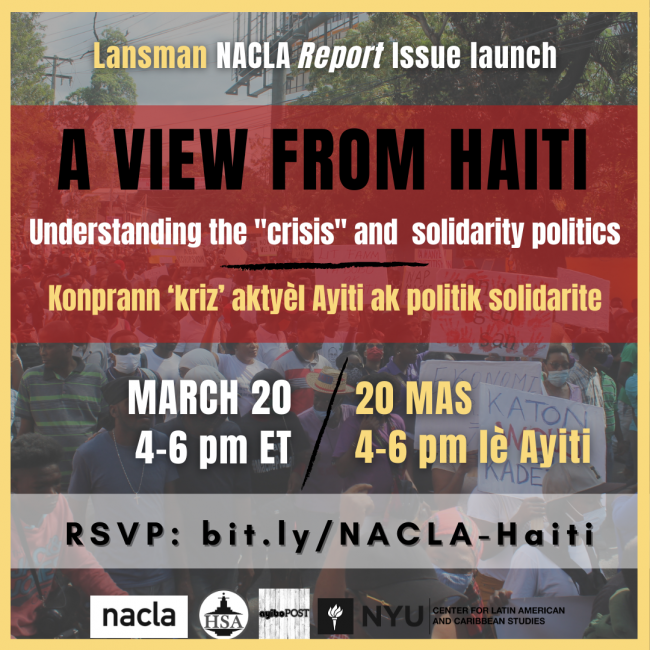*Español abajo
Join us for the virtual launch of the spring 2021 issue of the NACLA Report on the Americas, "End of Empire? Racial Capitalism, Forced Migration, and State Violence in Haiti."
*Co-sponsored by Haitian Studies Association, Ayibopost, the Center for Latin American and Caribbean Studies at New York University, and the Kimberly Green Latin America and Caribbean Center at Florida International University
**This event will be held in Haitian Kreyòl and simultaneously interpreted in English and Spanish.

About the Event:
Haiti has garnered front-page attention since February 7, when President Jovenel Moïse's term expired. Rather signal support for democracy in its oldest neighbor, newly inaugurated President Biden's first words and actions continued U.S. support for Moïse. The Biden administration also deported almost as many Haitians in one month as Trump did all last year.
What's happening on the ground in Haiti? How can people—in the diaspora and our friends in countries around the world—engage in effective solidarity action?
This launch of the latest issue of the NACLA Report offers a series of grounded perspectives to not only reflect on Haiti's contemporary situation as it unfolds, but also hopefully to inspire a more principled, informed, and engaged solidarity politics. Linked by history and the global racial economy, struggles in Haiti and in the United States are manifestations of an Empire grasping for new strategues as the extractivist paradigm is reaching its natural limit. The current moment requires more active engagement, and for us to see how we are not only connected by particular issues, but also connected to communities that are differently situated along global capitalism's process of accumulation by appropriation.
RSVP here.
WHEN: Saturday, March 20th, 2021. 4-6pm ET.
WHERE: Registration required. Click here for more information.
About the Moderator:
Mamyrah Dougé-Prosper is a Visiting Assistant Professor of Africana Studies at Davidson College. Her doctoral work centered on a coalition of social movement organizations calling for an end to the ongoing "non-governmental" occupation of Haiti. She is currently working on a monograph entitled Development Contested in Occupied Haiti: Social Movements, NGOs, and the Evangelical State. She has also served as an organizer with land and housing rights organizations Take Back the Land-Miami and is presently the International Coordinator for Community Movement Builders.
Mark Schuller is Professor at Northern Illinois University and affiliate at the Faculté d'Ethnologie, l'Université d'État d'Haïti. Author or co-editor of eight books, including Humanity's Last Stand, he has written over 40 book chapters and peer-reviewed articles and more in public media. Recipient of the Margaret Mead Award and the Anthropology in Media Award, Schuller is president of the Haitian Studies Association and the United Faculty Alliance, NIU's faculty union.
About the Speakers:
Samuel Nesner is a community organizer who lives and works in Haiti.
Dr. James Darbouze is a philosopher, sociologist, urban planner, independent teacher-researcher, and Haitian militant.
Guerline Jozef is the co-founder and Executive Director of the Haitian Bridge Alliance and the Black Immigrants Bail Fund. She works directly with communities along the U.S. southern border affected by the deportation machine.
Dr. Sabine Lamour is a sociologist trained in France and Haiti, currently researching the role of the Evangelical Church in politics. She is a feminist activist, independent consultant, national coordinator of Solidarite Fanm Ayisyen (SOFA), and instructor at l'Université d'État d'Haïti (UEH). She coedited thee book Déjouer le Silence: Contre-discours sur les Femmes Haïtennes (2018).
Dr. Djems Olivier has a doctorate in geography from the University of Paris VIII Vincennes-Saint-Denis. He is a member of the Laboratory of Social Dynamics and Spatial Reconstruction (LADYSS). His research questions humanitarian practices in precarious neighorborhoods of southern metropolises, particularly in Haiti.
Ninaj Raoul is a co-founder and community organizer at Haitian Women for Haitian Refugees (HWHR).
Perspectivas para entender la “crisis” y construir una política solidaria.
* Con la colaboración de Haitian Studies Association, Ayibopost, NYU Center for Latin American and Caribbean Studies, y Kimberly Green Latin America and Caribbean Center at Florida International University
** El evento se desarrollará en Kreyol Haitiano con traducción al inglés y el español.
FECHA: Sábado, 20 de marzo, 4-6pm ET
Haz clic aquí para registrarse.

Conversatorio moderado por: Mamyrah Dougé-Prosper y Mark Schuller
Participantes: James Darbouze, Sabine Lamour, Djems Olivier, Samuel Nesner, Guerline Jozef, Ninaj Raoul
Haití ha obtenido cobertura de primera página desde el 7 de febrero, cuando el mandato del presidente Jovenel Moïse se venció. En vez de apoyar la democracia en su país vecino más antiguo, las primeras acciones y palabras del nuevo presidente Joseph Biden continuaron respaldando a Moïse. Al mismo tiempo, la administración de Biden deportó casi la misma cantidad de haitianxs en un solo mes que hizo Trump en todo el año pasado.
¿Que está pasando en Haití? ¿Como la gente—en la diáspora y nuestrxs amigxs en países alrededor del mundo—pueda participar en una acción solidaria eficaz?
El estreno del nuevo número del NACLA Report ofrece una serie de perspectivas que no solo reflejan la situación actual en Haití, pero que también inspiran una política solidaria más informada, fundamentada, y comprometida. Vinculadas por la historia y la economía racial global, las luchas en Haití y en los EEUU son síntomas del imperio norteaméricano buscando nuevas estrategias mientras que el modelo extractivista topa con su límite natural. El momento actual requiere una participación más activa y nos obliga que vemos que no solo somos interconectadxs por asuntos particulares sino también somos vinculadxs a comunidades ubicadas de maneras distintas en los procesos de acumulación por desposesión del capitalismo global.
